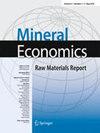钴:1975-2018年的公司集中度
IF 3.5
Q1 ECONOMICS
引用次数: 0
摘要
世界对刚果钴矿和中国钴精炼厂的依赖被视为严重的安全问题,对能源转型具有潜在的危险影响。不过,中国炼厂也存在类似的供应安全问题,因为其大部分钴精矿都是进口的。大多数供应安全研究都从国家的角度来看待市场集中度和供应风险。然而,矿山和精炼厂的控制权掌握在生产公司手中,而不是它们所在国家的政府。本文分析了较长时间内钴行业在矿山和精炼阶段的公司结构,以确定公司集中度的变化,并对2018年的情况进行了展望。公司在采矿阶段的集中程度较低,不会引起市场失灵或缺乏竞争力的担忧。企业对精炼钴的集中度取决于中国政府对中国生产的影响力:如果假设国家对个别炼油厂的控制很强,那么企业集中度就会很高。可以通过改善刚果民主共和国的总体政治稳定来加强矿山阶段的供应安全,使该国对目前以外的投资者更具吸引力。增加当地的选矿将大大有利于刚果,并减少中国的影响。这是一个漫长而复杂的过程,其成功与否根本没有把握。在炼油阶段,解决方案要简单得多:在中国以外的国家建设炼油厂,可以提高供应的可靠性。本文章由计算机程序翻译,如有差异,请以英文原文为准。
Cobalt: corporate concentration 1975–2018
Abstract The world’s dependency on cobalt mines in Congo and cobalt refineries in China is seen as serious security issues with potentially dangerous implications for the energy transition. However, Chinese refineries have a similar supply security issue as most of its cobalt concentrates are imported. Most supply security studies take a country perspective on market concentration and supply risks. However, control of the mines and refineries lies with the producing companies, not the governments of the countries where they are located. This paper analyses the corporate structure of the cobalt industry at the mine and the refinery stages over a longer time period to establish changes in the level of corporate concentration and to put the situation in 2018 in perspective. The level of corporate concentration at the mine stage is low and does not raise concerns for market failures or a lack of competitiveness. Corporate concentration of refined cobalt depends on the Chinese government’s influence over Chinese production: if the state control over individual refineries is assumed to be strong, the corporate concentration is high. Mine stage supply security could be strengthened by improving the general political stability in the DRC to make the country more attractive for investors other than the present ones. Increased local beneficiation would strongly benefit Congo and reduce China’s influence. This is a long and complicated process and its success is not at all certain. At the refinery stage, the solution is much easier: reliability of supply could be improved by constructing refineries in countries outside China.
求助全文
通过发布文献求助,成功后即可免费获取论文全文。
去求助
来源期刊
CiteScore
5.00
自引率
12.00%
发文量
62
期刊介绍:
Mineral Economics – Raw Materials Report is an international multidisciplinary journal focused on economics and policy issues in the minerals metals and mining industries. The journal exists to improve the understanding of economic social environmental and political implications of natural resources. The main focus is on non-fuel minerals metals and the mining industry and its role in society.Mineral Economics is widening its scope and particularly invites papers on: Socio-economic aspects of mining e.g. social license to operate indigenous peoples theory of change Materials for the Green transition e.g. battery metals ICT elements policies to secure supply of these elements Minerals in the periphery e.g. the Arctic deep-seabed and space Mineral Economics serves as a platform for academics industry practitioners decision makers and other experts who want to share perspectives and knowledge about natural resources.A wide range of topics have traditionally been covered including among others: mineral market analysis exploration and development resource availability market development price formation international trade environmental policy sustainability issues competition issues.Mineral Economics is a joint project of Lule? University of Technology and R?varugruppen Ekonomisk F?rening the organization which founded the journal Raw Materials Report in 1981

 求助内容:
求助内容: 应助结果提醒方式:
应助结果提醒方式:


